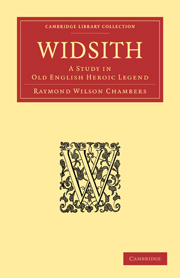Book contents
- Frontmatter
- PREFACE
- Contents
- CORRECTIONS AND ADDITIONAL NOTES
- CHAP. I WIDSITH AND THE GERMAN HEROIC AGE
- CHAP. II THE STORIES KNOWN TO WIDSITH: GOTHIC AND BURGUNDIAN HEROES
- CHAP. III THE STORIES KNOWN TO WIDSITH: TALES OF THE SEA-FOLK, OF THE FRANKS AND OF THE LOMBARDS
- CHAP. IV WIDSITH AND THE CRITICS
- CHAP. V THE GEOGRAPHY OF WIDSITH
- CHAP. VI THE LANGUAGE AND METRE OF WIDSITH
- CHAP. VII SUMMARY AND CONCLUSION
- TEXT OF WIDSITH, WITH NOTES
- APPENDIX
- MAPS AND INDEX
CHAP. VII - SUMMARY AND CONCLUSION
Published online by Cambridge University Press: 16 May 2011
- Frontmatter
- PREFACE
- Contents
- CORRECTIONS AND ADDITIONAL NOTES
- CHAP. I WIDSITH AND THE GERMAN HEROIC AGE
- CHAP. II THE STORIES KNOWN TO WIDSITH: GOTHIC AND BURGUNDIAN HEROES
- CHAP. III THE STORIES KNOWN TO WIDSITH: TALES OF THE SEA-FOLK, OF THE FRANKS AND OF THE LOMBARDS
- CHAP. IV WIDSITH AND THE CRITICS
- CHAP. V THE GEOGRAPHY OF WIDSITH
- CHAP. VI THE LANGUAGE AND METRE OF WIDSITH
- CHAP. VII SUMMARY AND CONCLUSION
- TEXT OF WIDSITH, WITH NOTES
- APPENDIX
- MAPS AND INDEX
Summary
The passages in Widsith which show traces of being later additions, and which were on that account rejected by the earlier critics, have been enumerated at the end of Chapter iv. A survey of the geography of the poem has emphasized the contrast between the stamp of definite locality borne by the undoubted portions, and the chaos of names found in the doubtful passages. A study of the grammar of the poem has shown that such examples of late usage as we do find occur in just those passages which the earlier critics, on grounds quite other than those of metre or language, had suspected of being later additions. The poem as a whole, and still more the undoubted portions, taken by themselves, we find to be more primitive in grammar and metre than the poems usually regarded as the oldest in English literature, such as Beowulf and Genesis A. Above all, the habit of always concluding the sentence with the line, never with the half line, dissociates these undoubted portions of the poem from Old English epic poetry, and connects them with a small group of poems which, in subject matter, all seem to go back to a more primitive period than that of the courtly or learned epic, as we know it.
Reason has been shown for believing that these undoubted portions of the poem fall into two sections, originally distinct, the Catalogue of Kings, and the lay of Ealhhild and Eormanric which we may regard as the essential Widsith.
- Type
- Chapter
- Information
- WidsithA Study in Old English Heroic Legend, pp. 177 - 186Publisher: Cambridge University PressPrint publication year: 2010First published in: 1912



